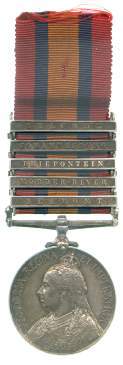Current Location: In storage
Maker(s)
Mint:
London
Ruler:
Victoria (1837-1901)
Artist:
Saulles, George W. de
Ruler:
Victoria regina et imperatrix
(With the title of)
Entities
Categories
Description
During the 1830s and 1840s several Dutch republics had been established outside the British Cape Colony in South Africa, among which were Transvaal and the Orange Free State, all now in modern South Africa. Transvaal was annexed briefly by the British but its independence re-established in the First Boer War.
In the 1880s however the discovery of vast gold reserves in Transvaal brought large numbers of foreign settlers, largely British, across the border, and an attempted coup at the instigation of Cecil Rhodes in 1895. Military escalation followed, negotiations failed and the two Boer republics, convinced that the British intended annexation, declared war in the Cape Colony in October 1899.
The immediate result was the siege of British troops in Ladysmith, Mafeking and Kimberley, while field forces attempting to come to their relief were defeated in several open battles by Boer contingents. Kimberley, the first town to be relieved, could open its gates only in mid-February; Mafeking, famously, had to hold out until May.
. Heavy British superiority in numbers meant that a full frontal advance was effective despite the casualties this tactic invited, and the Boers fell back to Graspan, which the British also forced them out of. The Boers fell back to the Modder River and there massed a resistance in force. Here, although outnumbering the British and defending their positions against all infantry assault, the Boers were unable to withstand the heavy British artillery fire and again had to withdraw, albeit with casualties far slighter than the British ones (75 to their 450). The British advance continued in this unbalanced way, including a bitter close engagement at Driefontein on 10 March 1900, whose site has only recently been reinvestigated.
Ladysmith was finally relieved on 15 February, by which time a fuller British offensive was driving the Boers back. Their resistance in the field was more or less quelled by May 1900, at the end of the which month the mining town of Johannesburg fell to British attack, but a final set-piece battle was fought at Bergendal (also known as the Battle of Belfast, after the larger town nearby) in which the Boer forces under Louis Botha, outnumbered four to one, were unable to hold off the British and finally withdrew from organised fighting. They maintained a bitter and obdurate guerilla campaign in several areas of the two Republics until mid-1902, when a surrender was finally agreed.
This medal was awarded to Private A. McDowell of the Coldstream Guards. The Guards were heavily involved in the Boer War at all stages of the fighting, and McDowell's battle honours, all along the slow advance to Ladysmith and then beyond in a succession of difficult engagements, reflect this clearly. The earliest issues of the medal indicate that the War was not expected to last as long as it did, as they bear the dates 1899-1900 in the reverse field. Very few were issued in this state, but a large number of the first issues show signs of the dates' erasure, often as in this case insufficiently thorough. Lester Watson purchased the medal at some point before 1928.
Notes
History note: Gift of L. Hoyt Watson; ex Lester Watson Collection, bt before 1928
Legal notes
Given by Lester Watson through Cambridge in America, 2009
Measurements and weight
Diameter: 36.3 mm
Weight: 50.77 g
Acquisition and important dates
Method of acquisition: Given
(2009)
by
Watson, Lester
Dating
Production date:
AD 1902
Materials used in production
Silver
Techniques used in production
Struck
Inscription or legends present
Inscription present: Bust of Victoria facing left with veil
- Text: VICTORIA REGINA ET IMPERATRIX
- Location: Obverse
- Type: Design
Inscription present: Britannia in foreground facing right holding standard and waving wreath over army marching along shore, with ships offshore in background
- Location: Reverse
- Type: Design
References and bibliographic entries
Identification numbers
Accession number: CM.1426-2009
Primary reference Number: 141520
Watson Catalogue: 338
Ordering: M-0309
Previous object number: LW.0309
Stable URI
Audit data
Created: Saturday 6 August 2011
Updated: Monday 25 March 2024
Last processed: Wednesday 14 May 2025
Associated departments & institutions
Owner or interested party:
The Fitzwilliam Museum
Associated department:
Coins and Medals





